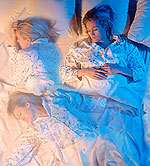 |
 |
 |

Sleep Disorder Could Signal Neurological Disease
Finding could help docs spot those at risk for dementia, Parkinson's, researchers say|
|
HealthDay
Wednesday, December 24, 2008
 WEDNESDAY, Dec. 24 (HealthDay News) -- People with a disorder that causes them to kick or cry out during deep sleep are more likely to develop dementia or Parkinson's disease, a new Canadian study suggests.
WEDNESDAY, Dec. 24 (HealthDay News) -- People with a disorder that causes them to kick or cry out during deep sleep are more likely to develop dementia or Parkinson's disease, a new Canadian study suggests.
"It's basically a disorder where you act out your dreams at night," explained study author Dr. Ronald B. Postuma, of McGill University in Montreal. "When people who have RBD [REM Sleep Behavior Disorder] dream they are in a fight, which is very common, they will make punching movements."
Researchers followed 93 RBD patients and examined them after five, 10 and 12 years for signs of neurological disorders such as dementia or Parkinson's disease. After 12 years, researchers found the majority of people with RBD developed either dementia or Parkinson's, with 26 developing neurodegenerative disease, 15 developing Parkinsons and 11 developing dementia.
"These disorders happen to 1 to 2 percent of the general population in their entire lives, so 50 percent at 12 years is much, much higher," Postuma said. His report was published in the Dec. 24 online issue of Neurology.
While sleep disorders are common, researchers emphasized that the majority are due to the stress of modern life and will not necessarily lead to neurological diseases.
"Half the population has a sleep problem, but most of the time, they're benign," said Michael Jakowec, an assistant professor of neurology at George and Mary Lou Boone Parkinson's Disease and Movement Disorders Research Center at the University of Southern California Keck School of Medicine. "We live in a society with anxiety, stress, late night TV and cappucinos."
"It's important to point out that this is a relatively dramatic disorder that comes on in your 50s and 60s, so it's not something that happens once in awhile your entire life," Postuma explained. "A little bit of sleep talking or waking up a little confused and then falling back asleep again are normal things that happen in the population."
Researchers hope that identifying those at risk for these diseases will help them develop new treatments to either slow or possibly even halt their progression.
"The main thing is to see if we can predict which of these people with RBD are going to get a disease and which are not," said Postuma. "We don't have ways to prevent those diseases now, but maybe that's because by the time a person has these diseases, it's too late to intervene."
"Unfortunately, we live in a society that doesn't do very much in terms of preventive medicine, but this may be one of those things where we do know there are lots of factors that can modify disease progression, so let's intervene now," said Jakowec. "Let's get you into things that we believe are protective against some of these diseases, such as changes in diet or lifestyle, which may add quite a few years of quality life to a patient."
"Everybody who has strong signs of REM sleep behavior disorder should probably be evaluated and probably be followed by a neurologist to make sure that everything's OK and to pick up early signs," Postuma said.
HealthDay
Copyright (c) 2008 ScoutNews, LLC. All rights reserved.
Related News:
More News on this Date
Related MedlinePlus Pages:
| Home | Health Topics | Drugs & Supplements | Encyclopedia | Dictionary | News | Directories | Other Resources | |
| Disclaimers | Copyright | Privacy | Accessibility | Quality Guidelines U.S. National Library of Medicine, 8600 Rockville Pike, Bethesda, MD 20894 National Institutes of Health | Department of Health & Human Services |
Date last updated: 25 December 2008 |




